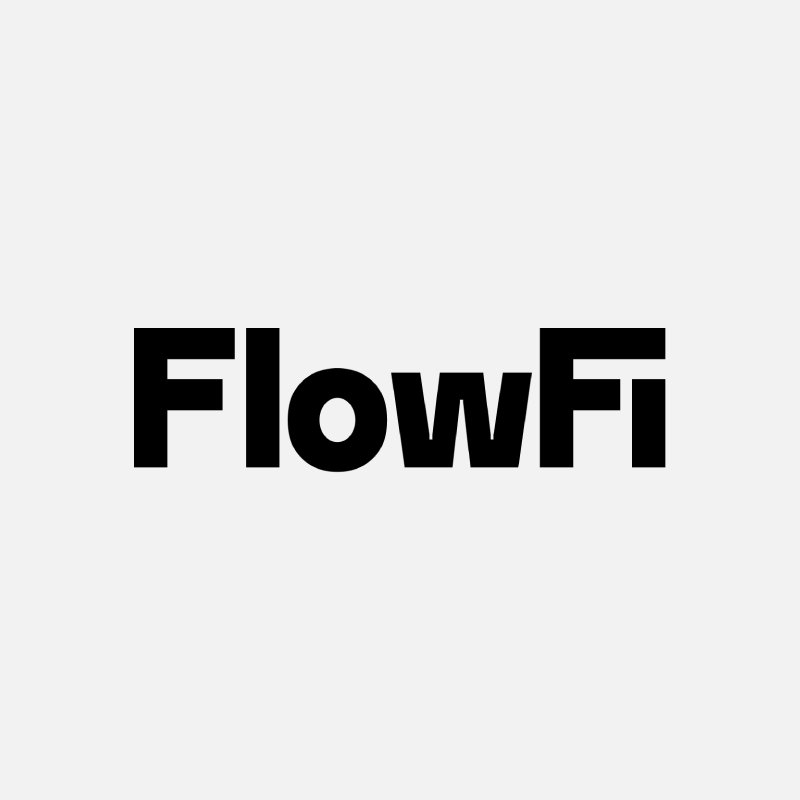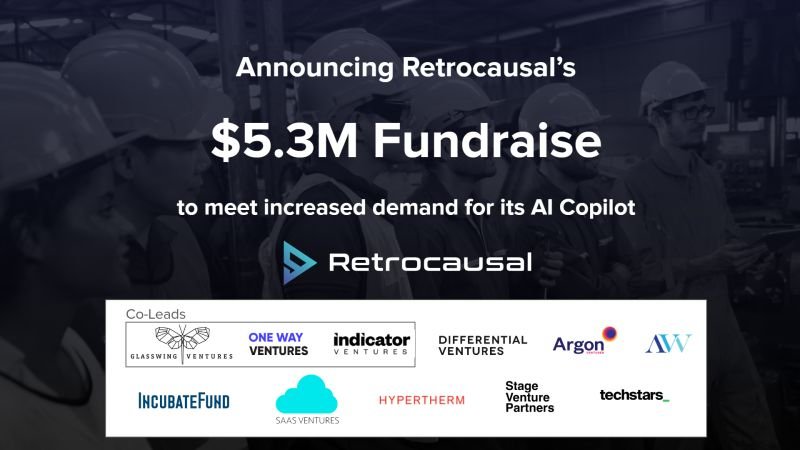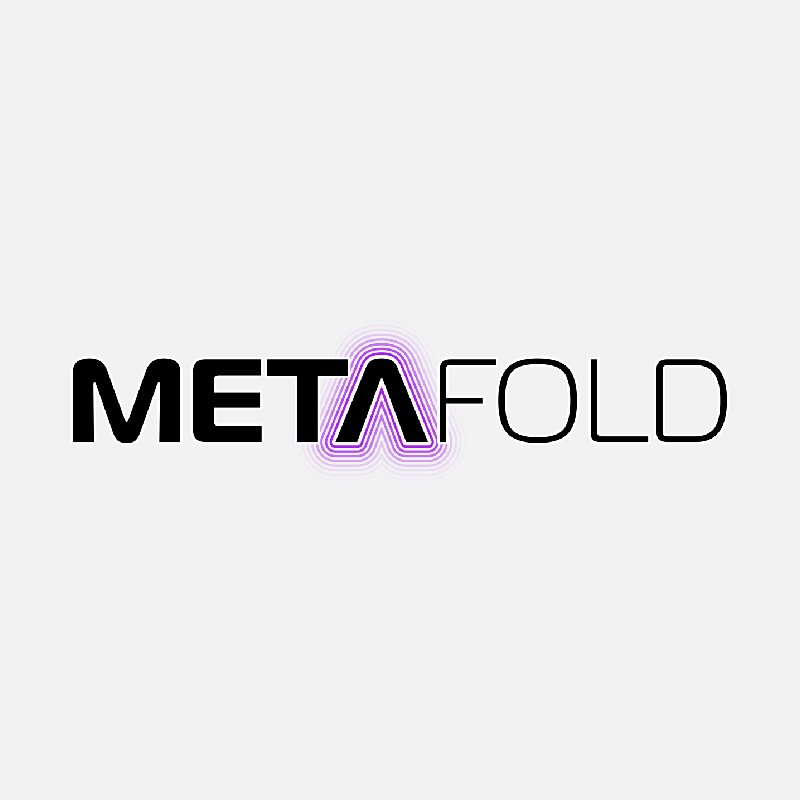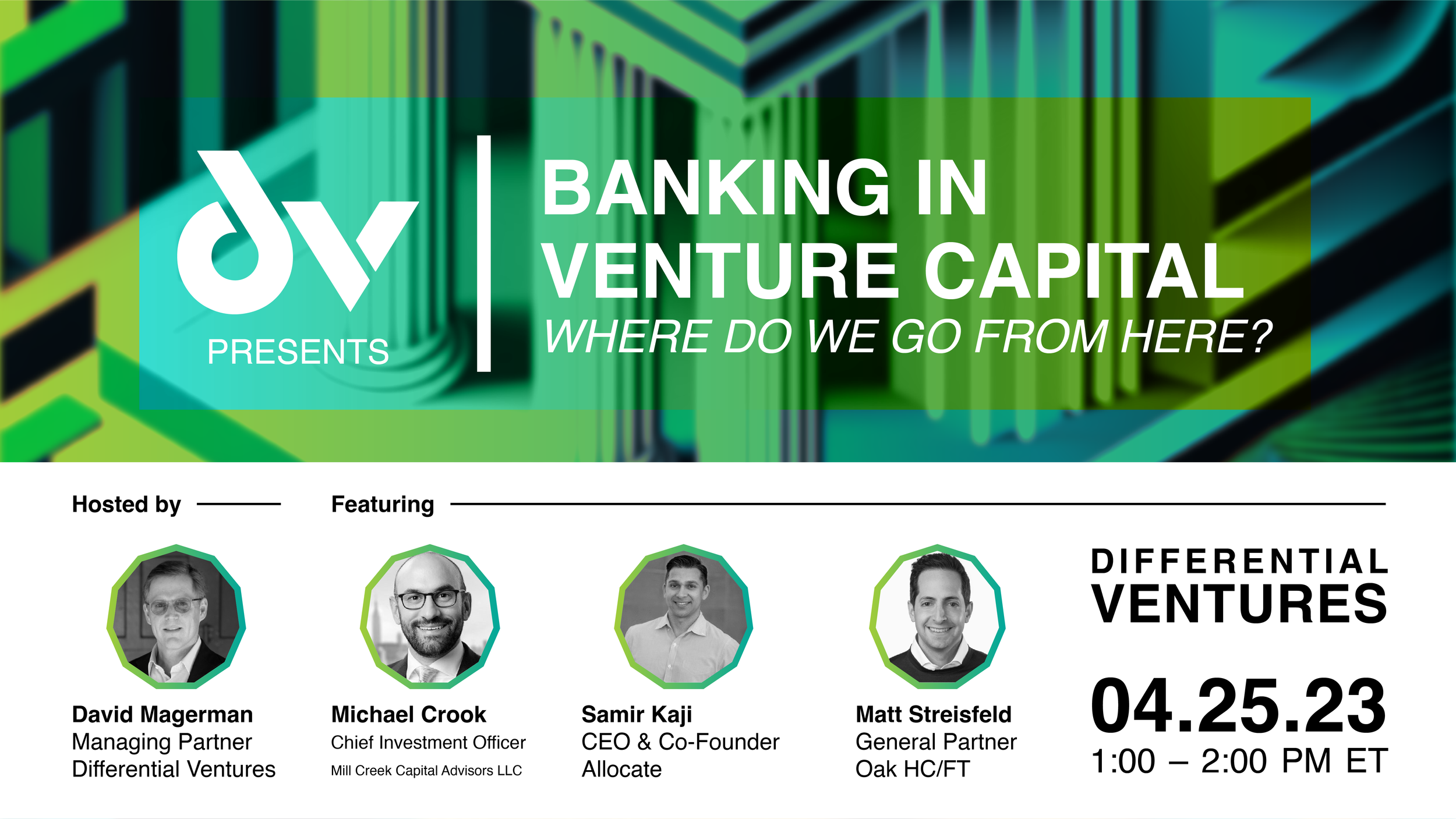State of New York Seed Investment - and where to find it
Seed capital allocated to startups in New York has been on the rise for the last decade when the financial crisis depressed real estate prices, attracting tech giants and entrepreneurs alike to Silicon Alley in droves. Simultaneously, investment bankers and hedge fund alumni set their sights [and bank accounts] on startups, looking to back the next Facebook or Snapchat. Now, there is more capital than ever in the system from a broader variety of sources than we have traditionally seen. In addition to VC firms, the system is now ripe with angel investors, accelerators, family offices, corporates, and ‘advisors.’ Yet today, seemingly more than ever, founders are frustrated with the opaque fundraising process and the, ever-increasing, barriers for securing seed funding. It is a contradiction worthy of further exploration.
Below is a quantitative breakdown of the NY seed investing ecosystem based on actual investments since 2009; not just self-reporting and marketing by VCs. In the spirit of more transparency, I am also opening up access to our database of investors who have deployed capital into New York-based seed stage companies over the last two years. Fundraising is painfully opaque so my hope is this can be used to identify target investors and filter based on the needs of your particular company. It’s not going to be perfect but should be valuable in understanding who has actually put capital to work vs. those who advertise themselves as seed investors.
A couple of things to note:
I use the term ‘seed’ to cover all stages of seed investment because it’s too long and cumbersome to type pre-seed, seed, late-seed, mango seed, and the myriad of terms that get thrown around now.
The research encompasses angel investments, incubators/accelerators, and institutional capital such as VC firms. I have included angel groups in the database but not individual angel investors.
There is not enough reliable data to report on whether these investors will invest pre-revenue or not. I assume most will/have but you will have to verify independently.
Keep reading for a glimpse into my super exciting weekend.
Seed Investments and Capital Deployed
During 2019, $1.358 billion was invested into 1,069 seed rounds. The number of deals completed is the lowest since 2013 but the amount of capital invested is second only to 2018 [$1.365 billion]. This could be due to a lag in reporting data so I assume the actual number is flat or slightly up from 2018. At a minimum, that equates to 8.6x the number of funding rounds and 13x the amount of capital deployed in NY a decade ago.
As you will see in the database, over 1,700 investors have deployed capital into 1,741 NY-based startups and 2,248 seed rounds over the last two years alone. Compare that to 2009 - 2010 when 296 investors participated in 342 seed deals across 319 companies.
This means that there is now an average of 1.29 pre-series A rounds raised per company compared to 1.15 in 2009 which ties back to an earlier post about how ‘seed is a journey.’ I’m going to cut to the punchline here and point out that there is a lot more capital available but also many more startups competing for that capital.
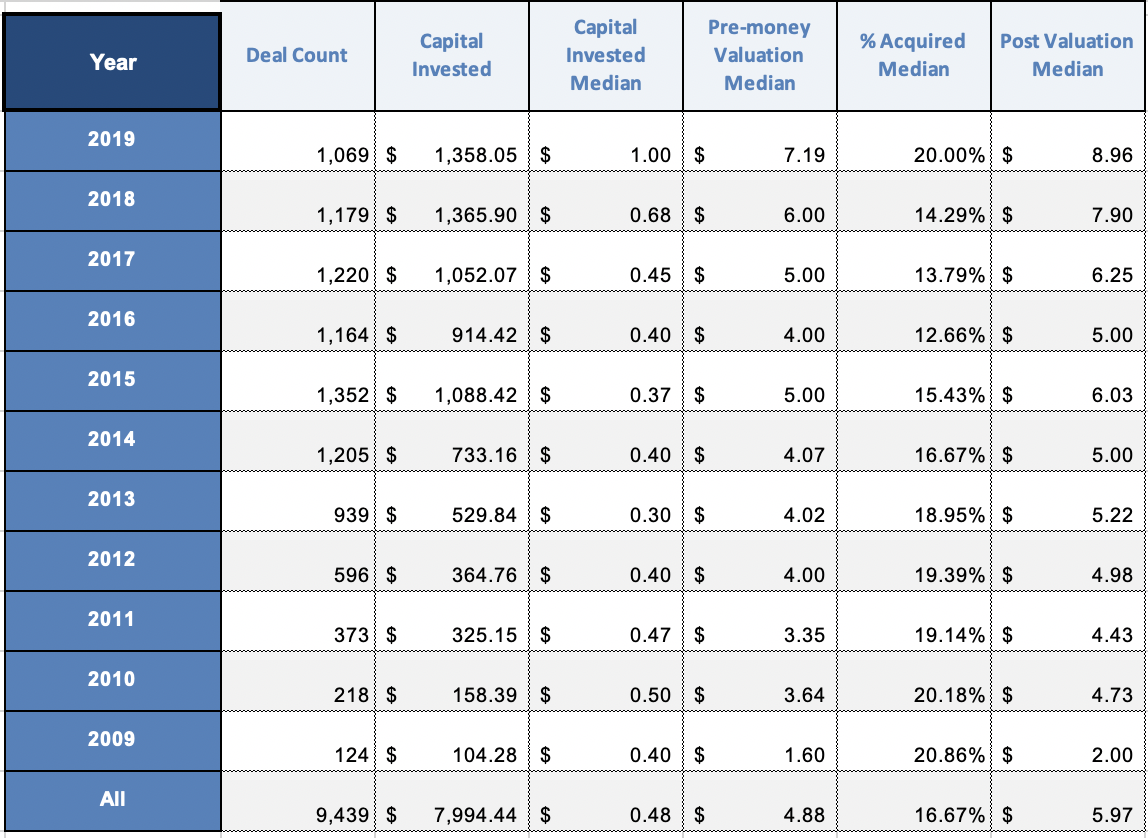
Deal Sizes and Valuation
The median seed round reached $1 million which is up 47% from 2018 and at least 2x every other year since 2009 when the New York startup ecosystem started to balloon. That’s quite a leap. Accordingly, the median post money valuation reached $8.96 million; also about 2x the numbers from a decade ago.
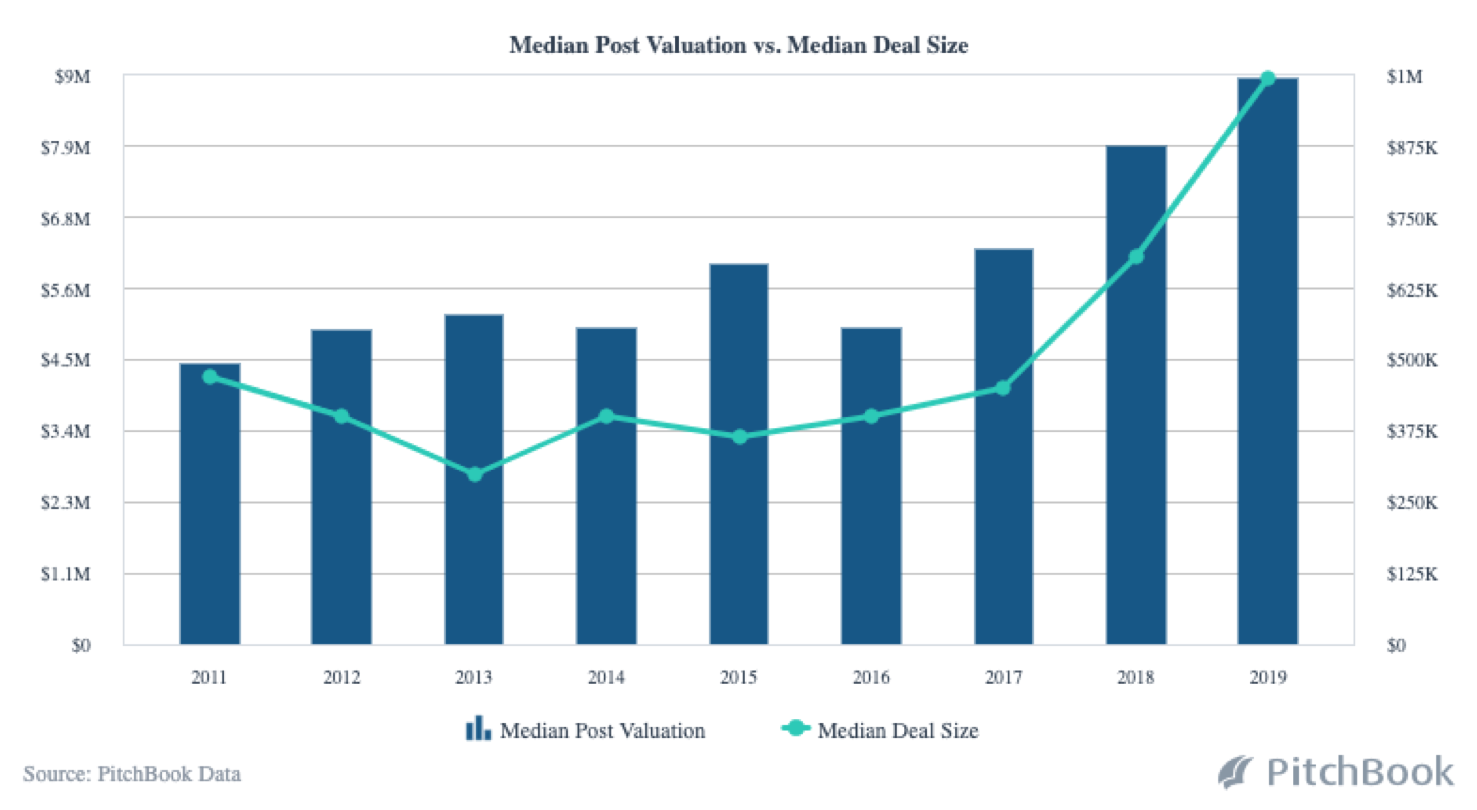
Investment by Type of Investor
Interestingly, Incubator and Accelerator deals dropped sharply during 2019; 393 investments, compared to 559 in 2018, while angel and seed rounds expanded in count. Seed round capital deployed by VCs also increased to record levels while angel capital decreased 22% despite the uptick in the number of deals funded by angels. I can’t be sure but my best guess is that founders are turning more to value adding angel investors and seed-stage VC funds who can add value to startups without the added economics, usually consisting of additional equity and/or a fee to participate, required by accelerators.

What is clear is that seed capital is out there but so is the competition. How capital is raised has changed over the last 15 years with the drastic reduction in costs to start a technology company and the broad characteristics of investors that will deploy capital in private markets. Clearly, gone are the days of putting together a pitch deck and sending it out to the handful of VC firms in NY for funding.
What other things are you doing to fund your business?
And if you want to send us your pitch deck you can use the button below!
More News & Insights
Differential goes on the record with Lizzy Kolar, the co-founder and CEO of Scope Zero. Scope Zero's mission is to reduce annual utility bills and fuel expenses by $300 billion, the environmental equivalent of removing 125M cars from the road.
Differential goes on the record with Moshe Hecht, an award-winning philanthropic futurist and innovator, reshaping the world of giving through technology and data solutions. The founder and CEO of Hatch, he is a dedicated philanthropist and has been published in Forbes, Guidestar, and Nonprofit Pro.
The WorkplaceTech Spotlight host Hadeel Al-Tashi sits down with Lizzy Kolar, Co-Founder and CEO of Scope Zero to dive into how Scope Zero's Carbon Savings Account (CSA) empowers employees to make affordable home technology and transportation upgrades while aligning with corporate sustainability goals. They discuss how the CSA not only supports environmental and financial wellness for employees but also strengthens a company's commitment to sustainability. Don't miss this opportunity to learn how integrating green benefits can drive meaningful impact within your organization.
Hatch AI, a groundbreaking intelligence platform for nonprofits, announced a $3 million raise in seed funding, led by Differential. Read the full press announcement at the link below.
MIT News: Alumni-founded Pienso has developed a user-friendly AI builder so domain experts can build solutions without writing any code.
On the Record with Nate Cavanaugh, CoFounder & Co-CEO of FlowFi.
In 2021, Nate co-founded of FlowFi, a SaaS-enabled marketplace that connects startups and SMBs with finance experts. FlowFi has raised $10M from top VC firms including Blumberg Capital, Differential Ventures, Clocktower Ventures and Precursor Ventures, and generated 7-figures of annual recurring revenue in its first year.
Nate was nominated to the Forbes 30 Under 30 list for Enterprise Technology.
TECHCRUNCH: FlowFi, a startup creating a marketplace of finance experts for entrepreneurs, closed on $9 million in seed funding.
Blumberg Capital led the investment and was joined by a group of investors including Parade Ventures, Differential Ventures, Precursor Ventures, Special Ventures, 14 Peaks Capital and Cooley LLP.
NASDAQ: Nasdaq TradeTalks: 2024 Cybersecurity Budget Outlook with Almog Apirion, Cyolo.
FINSMES: Retrocausal, a Seattle, WA-based platform provider for manufacturing process management, raised $5.3M in funding.
The round was led by Glasswing Ventures, One Way Ventures, and Indicator Ventures, with participation from existing investors Argon Ventures, Differential Ventures, Ascend Vietnam Ventures, Incubate Fund US, SaaS Ventures, Hypertherm Ventures, Stage Venture Partners, and Techstars.
AI and the Future of Work Podcast: Entrepreneurs wonder what it’s like to be a VC. And VCs without an operating background often don’t understand the grit required to turn an idea into a successful business. The best investors have been successful operators first.
Today’s guest is one of those. Nick Adams founded Differential Ventures in 2017 to invest in B2B, data-first seed-stage companies. Since then, Nick and the team have invested in an impressive group of companies including Private AI, Ocrolus, and Agnostiq.
On the Record with Elissa Ross, CoFounder & CEO of Metafold. Elissa Ross is a mathematician and the CEO of Toronto-based startup Metafold 3D. Metafold makes an engineering design platform for additive manufacturing, with an emphasis on supporting engineers using metamaterials, lattices and microstructures at industrial scales. Elissa holds a PhD in discrete geometry (2011), and worked as an industrial geometry consultant for the 8 years prior to cofounding Metafold. Metafold is the result of observations made in the consulting context about the challenges and opportunities of 3D printing.
Nick Adams on PM360: To get a better grasp on what eventual AI regulations could and should look like, PM360 spoke with Nick Adams, Founding Partner at Differential Ventures. In addition to starting the venture capital firm focused on AI/machine learning in 2018, Adams is also a member of the cybersecurity and national security subcommittee for the National Venture Capital Association and recently briefed members of Congress on AI policy and potential regulation.
BETAKIT: Metafold 3D, which wants to make it easier for manufacturers to design and 3D print complex parts, has secured $2.35 million CAD ($1.78 million USD) in seed funding.
Toronto-based Metafold was founded in 2020 by a group of math, geometry, and architecture experts in CEO Elissa Ross, CTO Daniel Hambleton, and COO Tom Reslinski. Born out of Hambleton’s geometry-focused consulting agency, Mesh Consultants, Metafold sells design for additive-manufacturing software to sportswear and biopharmaceutical companies.
Nick Adams on TECHBREW: For all the pixels spilled about the promises of generative AI, it’s starting to feel like we’re telling the same story over and over again. AI is serviceable at document summarization and shows promise in customer service applications. But it generates fictions (the industry prefers the euphemistic and anthropomorphizing term “hallucinates”) and is limited by the data on which it’s trained.
ATLANTA and TEL AVIV, Israel, June 29, 2023 /PRNewswire/ -- Mona, the leading intelligent monitoring platform, unveils a new monitoring solution for GPT-based applications. The free, self-service offering provides businesses with granular visibility into GPT-based products and valuable insights into costs, performance, and quality.
David Magerman on THEINFORMATION: OpenAI’s stated goal is to develop and promote a software system capable of artificial general intelligence. Toward that end, the company has released systems based on large-language models, which can respond to prompts with fluent conversation on many subjects. ChatGPT, Microsoft’s Bing chatbot and other new systems based on OpenAI’s GPT-3 and GPT-4 models are truly incredible and perform far beyond previous attempts at achieving AGI.
BUSINESSWIRE: Morgan Stanley at Work and Carver Edison, a financial technology company, announced today that Shareworks has joined Equity Edge Online® in offering Cashless Participation® to U.S.-based corporate clients. Since the initial launch of Cashless Participation® on Equity Edge Online®, stock plan participants have purchased more than one million shares1 with Cashless Participation®. Now that Shareworks has also launched the tool, a wider cohort of Morgan Stanley at Work corporate clients will have access.
FOX5 WASHINGTON DC: Nick Adams discusses the pros and cons of Artificial intelligence.
PULSE 2.0: Differential Ventures is a seed-stage venture capital fund that was founded by data scientists and entrepreneurs for data-focused entrepreneurs. To learn more about the firm, Pulse 2.0 interviewed Differential Ventures’ managing partner and co-founder Nick Adams.
IoTForAll: Golioth, a leading developer platform for the Industrial Internet of Things (IIoT), announced open access to a library of new reference designs for embedded engineers to accelerate their time to market, the launch of a Select Partner Program for energy and construction developers, and the completion of a $4.6M round of seed funding led by Blackhorn Ventures and Differential Ventures with participation from existing investors, Zetta Venture Partners, MongoDB Ventures and Lorimer Ventures.
VENTURE BEAT: Data privacy provider Private AI, announced the launch of PrivateGPT, a “privacy layer” for large language models (LLMs) such as OpenAI’s ChatGPT. The new tool is designed to automatically redact sensitive information and personally identifiable information (PII) from user prompts.
DIGINOMICA: What can an early-stage investor tell enterprises about the nascent quantum market?
The quantum tipping point – that fabled moment when quantum technologies break through to commercial adoption at scale – has been questioned in a previous diginomica report…
ENTER QUANTUM: Experts agree that commercial quantum computing at scale could be as much as 10 years away, but this hasn’t stopped investors from betting on it turning a profit in the near future. U.S. tech venture capital company Differential Ventures led the recent $6 million seed extension round for quantum software company Agnostiq which it will use to accelerate further development and commercialization of its enterprise-grade quantum and high-performance computing platform Covalent.
In this Q&A, Differential founding partner David Magerman explains why investors are throwing their weight behind commercial quantum now.
On Tuesday, April 25th, 2023, Differential Ventures hosted a webinar on “Banking in Venture Capital & the Tech Industry”. The panel was moderated by David Magerman, Managing Partner of Differential Ventures, and joined by guest speakers Michael Crook (Chief Investment Officer, Mill Creek Capital Advisers), Samir Kaji (CEO & Cofounder, Allocate), and Matt Streisfeld (General Partner, Oak HC/FT).
AICamp: Augment is a 3 month long accelerator program run by Betaworks, aimed at bringing together the most creative pre-seed & seed stage companies building software powered by AI to augment human activity.
Quantum computing startup Agnostiq Inc. said today, April 5, 2023, it has closed on a seed funding round worth $6.1 million to help accelerate the development of its enterprise-grade quantum and high-performance computing platform.
Sand Hill Road Podcast: Nick Adams joined the Sand Hill Road podcast to discuss the way startups can survive a downturn.
UniteAI: There’s no question that machine learning operations (MLOps) is a burgeoning sector. The market is projected to reach $700 million by 2025 – almost four times what it was in 2020.
Still, while technically sound and powerful, these solutions haven’t generated the expected revenue, which has raised concerns about future growth.








